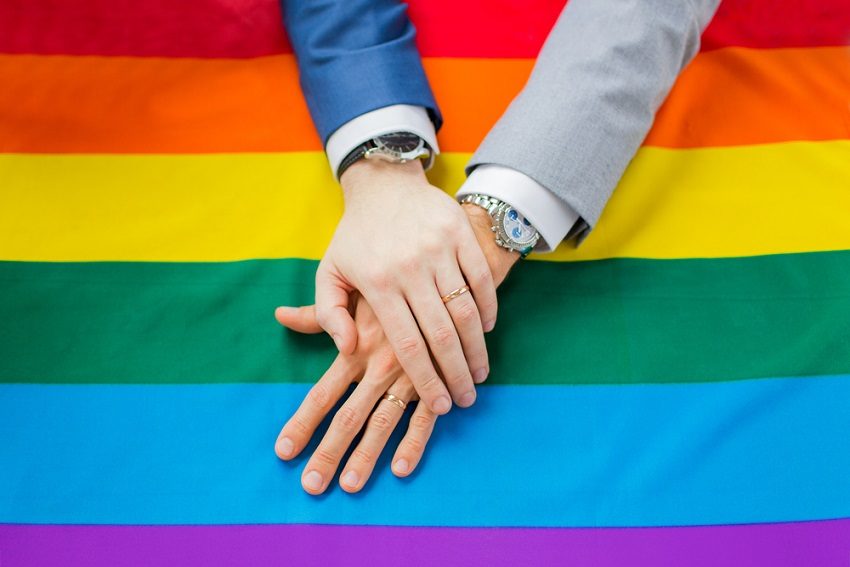Breaking news: marriage has very little to do with religion (and vice versa)

As further tensions emerge in the Coalition government over the details of the proposed marriage plebiscite, reportage of the religious nature of the “no” campaign is becoming more prominent. Yet the relationship between religion and marriage is not clear to many people and is being distorted in the media.
It’s noticeable that the most prominent opponents of marriage equality hold conservative religious views. It’s equally noticeable that few, if any, public arguments against equal marriage are based on religious grounds. Instead, we hear “scientif-ish” arguments: those shrouded in the language of secular scholarship, but which don’t pass scholarly review. These arguments can be demonstrated to be misleading. But, for the general listener, they muddy the water enough to create doubt and legitimise the “no” campaign on seemingly secular grounds. I’ve argued elsewhere that these arguments are effectively a Trojan horse for an aggressive, theologically and socially conservative agenda.
Why are there no religious arguments against marriage equality?
Opponents of marriage equality cannot make legitimate religious arguments in support of their case because, in Australia, marriage is a secular institution. Marriage is regulated by the state. Religious marriage celebrants conduct weddings, but legally they do so on behalf of the state in the same capacity as secular celebrants. Marriage itself is not a religious institution. Australia has a long tradition of secular government, and also of toleration of different religious traditions. That includes those regarding marriage. This tradition of difference and tolerance was summarised last week by Australia’s most senior Anglican, Archbishop Philip Freier. Writing to all Australian bishops about the proposed marriage plebiscite, he said the church should accept marriage equality if it comes into law: We can still stand for and offer holy matrimony between a man and a woman as a sacred ordinance given by God, while accepting that the state has endorsed a wider view of marriage. Freier pointed out the church and state already have differing views on marriage, citing the state’s endorsement of de-facto relationships, which are not accepted in the Anglican Church. To this we could add different attitudes towards divorce (in Catholicism), polygamy (in some Muslim groups), or even gay marriage (promoted by Quakers). As Freier has previously said, in a secular, multicultural and pluralistic country like Australia: It is no longer reasonable for us to expect that the state’s approach will be as prescriptive and demanding as the Christian understanding, but nor is it reasonable for the state to expect Christians to give up their comprehensive and long-standing view. In short, the passage of marriage equality will have no impact on religious teaching on marriage ethics. It will merely continue our history of divergent and wider views of marriage. Religious communities can continue to make decisions about their own ethical and moral standards for relationships. Marriage equality won’t change that. But they should also respect the changed moral compass of Australian society with regard to marriage.
Why is religion seen to be opposed to marriage equality?
If the relationship between marriage law and religious tradition is as cut-and-dried as Freier explains, why is religious opposition to marriage equality reported as being so significant? I suggest that there are two reasons. First, religious voices have been some of the loudest raised in opposition to marriage equality. Conservative Christians in the right of the Liberal Party, such as Eric Abetz, Cory Bernardi and Kevin Andrews, are flexing their muscles in parliament. And the Australian Christian Lobby takes every opportunity to represent its hardline views as those of Australian Christians. Second, the dynamics of contemporary mainstream media distort the representation of religion in this context. A series of recent polls show that a majority of people of faith support marriage equality. In this matter, the Christian right is not representative of the majority of Christians. Unfortunately, media consumers are unlikely to realise this. The media’s need to appear to be fair and balanced has frequently produced a “false balance” on this issue. The desire to present equivalent “pro” and “anti” voices has led to the unwarranted amplification of certain conservative voices. Freier heads Australia’s largest Protestant church. But his espousal of moderate (but still conservative) views doesn’t easily fit the oppositional dynamic of “balance”. The Australian Christian Lobby, founded by wealthy mining interests and not representative of any Christian churches, makes better headlines. The media have thus been complicit in distorting the role of religion in the marriage debate and helping the Christian right punch above its weight. To curb the distortion of religion in the media, reporting of religious involvement in marriage politics must resist false balance and oppositions. Marriage is not a religious institution, and religion is not categorically opposed to marriage equality. The majority of Australians of faith support marriage equality. The religious right are promoting the plebiscite because they know it will hand a megaphone to the shrinking minority of Australians who have negative views of LGBT people and their relationships. It is imperative, if the marriage plebiscite goes ahead, that media representations of religion improve.![]() Timothy W. Jones, Senior Lecturer in History, La Trobe University This article was originally published on The Conversation. Read the original article.
Timothy W. Jones, Senior Lecturer in History, La Trobe University This article was originally published on The Conversation. Read the original article.